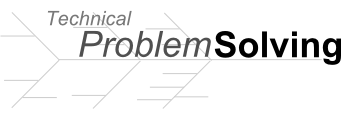I started reading the book "Turning Numbers into Knowledge" (I suppose this book is in many way what my website will be about). In chapter 1 Koomey talks about a "Beginner's mind" - looking at things from a fresh, unbiased perspective. I think this is an issue of Diversity of thought. My company is currently making a big deal about "Diversity" without really defining what it means. Most people are taking it to mean we have to have male/female, ethnic group, race diversity. What may be more important than such diversity is a diversity of thought (and perhaps how you approach problems). You can have all white males in a room, but if they all approach a problem from a different perspective it is just as powerful as if you had a whole mix of race/gender/ethnicity. Perhaps even more powerful because you don't spend time trying to explain things to everyone. There must be a balance, diversity to get different perspectives, but some commonality or else you never get on the same page.
I suppose my website on Technical Problem solving should address ways to cultivate diverse thinking. I myself tend to approach things pretty uniformly. I wonder if that is typical of all people? If you can cultivate diverse thinking, then you can become a great problem solver since you don't have to waste time explaining things to yourself.
Friday, September 26, 2008
Wednesday, September 24, 2008
data, information, & Knowledge
Several years ago I read the book "Data Smog". The central premise of this book (as I remember it) was that we are being overloaded with data. I don't recall much about how one was supposed to deal with the issue. I suppose I should re-read that book since I expect it went beyond being a diatribe about data overload, but this blog and associated website are about the process of distilling Knowledge out of information which in turn comes from data. We are inundated with data and being a successful problem solver means that we must be able to obtain information from that data. Obtaining information alone is insufficient. I may have access to lots of information but if I don't act on it or use it, it is just information and not knowledge. I can be sitting in the middle of the Library of Congress and if I don't use that information, I have no knowledge. Knowledge is information in action.
I guess without a problem to solve, then knowledge is just information since you can't put it into action. Until I have a problem, I have no use for all that stuff in the library.
I guess without a problem to solve, then knowledge is just information since you can't put it into action. Until I have a problem, I have no use for all that stuff in the library.
Tuesday, September 23, 2008
Initial Thoughts
In an attempt to compile, summarize, and make use of a variety of problem solving techniques and approaches, I have begun two simultaneous approaches. The first is a blog where I hope to document the process of creating a website devoted to technical problem solving. By documenting the process, I will hopefully be able to mine some useful information about the process. Also I suppose it will be used to track changes in my thoughts and the process over time and help me to find my way. As I have written on the website, this is in itself a problem solution and may be useful to others (and myself) in observing (reviewing) the process.
Today I created the website http://sites.google.com/site/technicalproblemsolving/ and posted some introductory comments. Pretty soon I need to establish an outline of the subjects I intend to cover. As is obvious by this item, I also created this blog.
Today I created the website http://sites.google.com/site/technicalproblemsolving/ and posted some introductory comments. Pretty soon I need to establish an outline of the subjects I intend to cover. As is obvious by this item, I also created this blog.
Subscribe to:
Comments (Atom)



